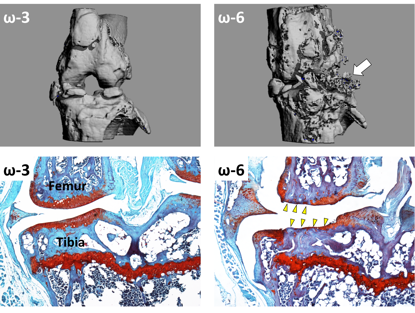Microcomputed tomography (3D X-ray) images (top) and histology images (bottom) of the knees of mice fed a very high fat diet containing omega 3 fatty acid supplement (left) or only omega 6 fatty acids (right) after a knee injury. The omega 6 diet showed abnormal bone remodeling and calcified tissue formation in the joint (white arrow). The omega 6 diet also showed significant loss of cartilage (red staining, yellow arrowhead) and increased joint inflammation. Credit: Duke Orthopaedic Research Laboratories
Mice consuming a supplement of omega 3 fatty acids had healthier joints than those fed diets high in saturated fats and omega 6 fatty acids, according to Duke Medicine researchers.
The findings, published in the Annals of the Rheumatic Diseases on July 11, 2014, suggest that unhealthy dietary fats – not just obesity – may contribute to worsening osteoarthritis.
"Our results suggest that dietary factors play a more significant role than mechanical factors in the link between obesity and osteoarthritis," said Farshid Guilak, Ph.D., Laszlo Ormandy Professor of Orthopaedic Surgery at Duke and the study's senior author.
Obesity is one of the primary risk factors for osteoarthritis, although the mechanisms linking these conditions are not fully understood. It has been assumed that increased weight wears the joints out, but this doesn't explain why arthritis is also found in hands and other joints that don't bear weight.
Guilak and his colleagues began studying systemic factors other than body weight to determine their effect on arthritis, and in an earlier study in obese mice, found that the lack of appetite hormone leptin predicted whether the mice had arthritis.
"This made us think that maybe it's not how much weight you gain, but what you eat," Guilak said.
In this study, the researchers focused on mice with osteoarthritis of the knee caused by injury to the joint. Arthritis resulting from trauma or injury is thought to account for 10 to 15 percent of all cases of arthritis.
The mice were fed one of three high-fat diets: one rich in saturated fat, one rich in omega 6 fatty acids, and one rich in omega 6 fatty acids but supplemented with a small amount of omega 3 fatty acids.
Saturated fat, which usually comes from animal sources, is known to raise cholesterol levels. Omega 6 fatty acids, often found in corn oil, soybean oil, nuts and seeds, are thought to be a healthier source of fat.
Omega 3 fatty acids, commonly found in fish or fish oil supplements, are often touted as "healthy fat" given their heart-healthy and anti-inflammatory properties. Unfortunately, most Americans eat significantly more saturated fat and omega 6 fatty acids than omega 3 fatty acids.
"A healthy diet would include roughly equal ratios of these fats, but we're way off the scale in the Western diet," Guilak said.
The researchers found that arthritis was significantly associated with the mice's diets, but not with body weight. The mice that ate diets high in saturated fat or omega 6 fatty acids experienced significant worsening of their arthritis, while mice consuming a small supplement of omega 3 fatty acids had healthier joints.
"While omega 3 fatty acids aren't reversing the injury, they appear to slow the progression of arthritis in this group of mice," Guilak said. "In fact, omega 3 fatty acids eliminated the detrimental effects of obesity in obese mice."
The researchers also looked at the mice's ability to heal wounds, which may help them to understand the relationships between arthritis and wound healing. In mice consuming omega 3 fatty acids, a small ear punch typically used to differentiate mice healed much more quickly than it did in animals that did not receive the supplement.
"We found that independent of body weight, dietary fatty acids regulate ear wound healing and severity of osteoarthritis following joint injury in obese mice," said Chia-Lung Wu, a biomedical engineering graduate student in the Duke Orthopaedic Research Laboratories and the study's lead author.
The researchers are working to translate their findings to humans.
"A great next step would be to do a clinical study to look at effect of omega 3 fatty acids post-injury," Guilak said.
More information: Annals of the Rheumatic Diseases , DOI: 10.1136/annrheumdis-2014-205601
Journal information: Annals of the Rheumatic Diseases
Provided by Duke University Medical Center



















